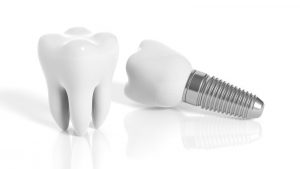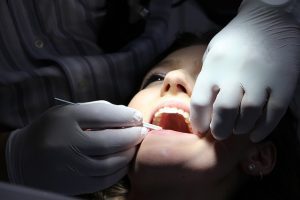A bright, radiant smile is often considered a universal symbol of health and beauty. While other cultures have a different idea on what a radiant smile looks like, the side of the world we exist on fixates on blindingly white teeth as the gold standard. As a result, the quest for whiter teeth has led to the popularity of various teeth whitening methods, ranging from at-home kits to professional dental procedures. In the pursuit of the perfect smile, a common question arises: Can dental implants undergo the same whitening process as natural teeth? Furthermore, what’s the best and healthiest way to achieve a dazzling, pearly-white smile?
If you’ve just left your dental surgeon who installed replacement titanium teeth implants into your mouth, you’re probably rocking a pretty bright tooth. But what happens when you consume things like coffee? Or wine? Or any of the other myriad foods that are known to stain your teeth, real or not?
Dental implants, artificial tooth roots surgically placed into the jawbone, have gained popularity as a reliable solution for missing teeth. They’re made out of a variety of materials too. Some of the most common are incredibly strong titanium tooth replacements and zirconium dental implants. Visiting an oral surgeon who is experienced in dental implants only takes a quick procedure to install them, and you can sometimes even get tooth replacements installed on the same day depending on a few different factors. All in all, they’re some of the best options out there for folks who are looking for affordable and reliable tooth replacement options. However, the question of whether dental implants can be whitened in the same way as natural teeth is a nuanced one.
Typically, dental implants themselves cannot be whitened. The material used in dental implants, often titanium or a titanium alloy, doesn’t respond to traditional whitening agents like natural tooth enamel. While the implant itself remains impervious to discoloration, the surrounding natural teeth may still be subject to staining over time. Obviously, we’re not going to leave you high and dry with one really white tooth that doesn’t stain and others that are turning a little bit more yellow with every cup of coffee. You can achieve that naturally-white smile even with a high-end dental implant made of titanium sitting in your mouth.
So, how can you ensure a consistent and uniform shade between your dental implants and natural teeth? Thankfully, it doesn’t involve intensive reconstruction surgery on the mouth, replacing every tooth with an implant that’s never going to yellow or stain. The key lies in strategic planning and coordination with your provider. Before undergoing teeth whitening procedures, it’s essential to discuss your situation with a dental professional who can guide you through the best approach.
One common recommendation is to whiten your natural teeth first and then match the shade of your dental implants to your newly brightened natural teeth. This coordinated approach ensures that your smile appears seamless and uniform, with both natural and artificial teeth blending harmoniously. Doing this allows your dental surgeon who deals in tooth replacements to find the best possible color for your implant, using the recently-whitened natural teeth as a baseline. This way, whenever you get your teeth whitened, they’ll match the implant almost perfectly. It’s an extra step in the process for sure, but it’s one that will save you a lot of problem-solving down the line if you can’t quite figure out how to get your natural teeth to match up with your implant.
Now, let’s delve into the best and healthiest ways to whiten your teeth, whether you have dental implants or not.
Professional Teeth Whitening
Seeking the expertise of a dentist for professional teeth whitening is a safe and effective option. In-office treatments often use higher concentrations of whitening agents, delivering quicker and more noticeable results. Dentists can customize the treatment based on your unique dental situation, ensuring optimal results without compromising your oral health.
At-Home Whitening Kits
At-home whitening kits, recommended and supervised by your dentist, provide a convenient option for maintaining your brighter smile. These kits typically include custom trays and whitening gel, allowing you to apply the treatment in the comfort of your home. It’s crucial to follow your dentist’s instructions to avoid overuse or misuse of the whitening agents. Overuse or misuse of whitening agents can lead to increased tooth sensitivity over time, gum irritation, and discoloration. It can also wear down your enamel if used too often. As the saying goes, “less is more.” Avoid a visit with your oral healthcare provider and make sure to not overdo it on the teeth whitening if using at-home kits versus going in for a professional whitening.
Maintain Good Oral Hygiene
A healthy smile starts with good oral hygiene. This isn’t anything new—good oral hygiene is the easiest way to prevent tooth loss and decay, and it’s your best option against gum disease and requiring a visit with a dental surgeon who specializes in gum grafting. But, did you know it’s also one of the easiest ways to help maintain your recently-whitened smile? Brushing your teeth twice a day, flossing regularly, and using an antiseptic mouthwash can help prevent stains and maintain the longevity of your whitening results.
Mind Your Diet
Certain foods and beverages, such as coffee, red wine, and dark berries, can contribute to teeth staining. Limiting their consumption or rinsing your mouth after indulging can help preserve your whitened smile. Drinking beverages like coffee through a straw when possible is also a great way to avoid contact with your teeth while still getting in that dose of caffeine we all love in the morning. Of course, if you’ve just recently gotten an implant or you’ve had some other kind of mouth surgery like removing impacted wisdom teeth, you’ll actually want to avoid straws for a short while. The suction effect from the straws can easily disrupt blood clots in the mouth that form following an operation and can lead to dry sockets and the potential for infection to set in.
Overall, achieving a brighter smile involves careful consideration of dental implants, a coordinated approach with your dentist, and a commitment to maintaining oral health. While dental implants themselves may not whiten, a strategic plan that encompasses both natural and artificial teeth can result in a radiant and seamless smile. Remember, consulting with your dentist is crucial to determine the best and healthiest teeth whitening approach tailored to your unique dental situation.










